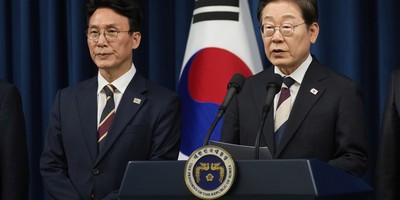For some of the brightest, most politically aware people in the country, the yearlong debate over the Democrats' national healthcare plan has been an inspiring experience. It has inspired them to run for Congress as Republicans. Dr. Larry Bucshon is one of them. A heart surgeon in Evansville, Ind., Bucshon watched the first months of Barack Obama's presidency with growing alarm. "It became clear to me that what he said in the campaign -- big government, more spending, more federal-government control -- was what he was really going to do," says Bucshon. By last summer, as the president and congressional Democrats turned to health care, Bucshon was thinking about running for the House from Indiana's 8th District. By October, he had joined the race. Bucshon is just one of what House GOP leaders believe is the best class of new candidates in many years. "So far, our successful recruitment efforts have helped produce over 95 top GOP recruits," says Rep. Kevin McCarthy, who is leading the recruitment drive for the National Republican Congressional Committee. And those are just the hot prospects in potentially winnable districts; there will also be Republican challengers for even the safest Democratic seats. Talk to the new candidates, and they're worried about the entire scope of Obama policy. But an indicator of the specific effect of Obamacare is the unusually large number of new recruits -- 31 -- who come from the medical profession. Twenty-four are doctors. The GOP already has a significant advantage in the number of physicians-turned-lawmakers -- at the Obama healthcare summit, the Republicans brought three doctors to the table, while the Democrats brought none -- and that advantage will probably grow in 2011. That gives them a special authority on what will surely be a continuing debate over Obamacare. "I think it will basically decimate the healthcare system in America," Bucshon says. "The number of doctors who are going to retire, and the number of young people who are no longer going to go into medicine, will be massive." But no matter what line of work the candidates come from, Republicans are growing more and more confident. "When we started out recruiting, right after the Obama win, the president had an approval rating of about 72 percent and we had just gotten through losing about 50 seats in the last two cycles," says Rep. Lynn Westmoreland, who is playing a key role the GOP effort. "It wasn't easy to recruit anybody." Then came Democratic overreach -- stimulus, cap and trade, health care. After that came GOP victories in the Virginia and New Jersey governors' races. And then came Scott Brown's Senate win in Massachusetts. A trickle of good candidates turned into a flood. There is Stephen Fincher in Tennessee, Cory Gardner in Colorado, Dennis Ross in Florida, Vaughn Ward in Idaho, Andy Harris in Maryland, Steve Stivers in Ohio, Pat Meehan in Pennsylvania, Tim Griffin in Arkansas and others. Westmoreland has talked to a lot of potential candidates in recruiting trips across the country. He hears the same thing over and over again. "Ninety-five percent say, 'I never really thought about running for Congress,'" says Westmoreland. "They say, 'I'm doing this to try to right the ship, to put the country back on the right course.'" What are their chances? By historical standards, the party out of power would probably pick up seats this November, but all signs point to something much bigger than that. Last month, the respected political analyst Charlie Cook raised a lot of eyebrows when he told National Journal, "It's very hard to come up with a scenario where Democrats don't lose the House." Democrats bristle when Republicans tell them they're committing political suicide by pushing so hard on health care. Democratic strategists point out that Republicans don't exactly have their best interests at heart. But don't listen to what Republicans say. Watch what they do. The new candidates deeply believe the Obama administration has put the country on the wrong track. They sense weakness in Democrats who had to be strong-armed into voting for Obamacare. They feel the support of growing numbers of voters in their districts. They're running hard, and they're most likely going to leave a bunch of Democrats without jobs. Obamacare will have consequences.
The Coming Consequences of Obamacare
The opinions expressed by columnists are their own and do not necessarily represent the views of Townhall.com.

Advertisement
Recommended
Trending on Townhall Videos
Advertisement
Advertisement
Advertisement
























Join the conversation as a VIP Member